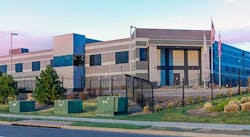Flexential Continues Its Expansion, Adding Capacity in Denver
Flexential continues to build in Denver, and will expand the power capacity at its Englewood Data Center to 11.25 megawatts, the company said today. The data center service provider said the phased power increase will become available for customers from spring 2022, supporting Flexential’s continued growth in the Denver market.
This Denver project marks the latest in a series of expansions and growth for Flexential, which recently raised $2.1 billion through an offering of asset-backed securities. Flexential said the funding “dramatically improves the company’s investment grade credit profile, lowers the cost of capital, and allows Flexential to deploy greater data center capacity to meet accelerating demands in new and existing markets.”
That includes Denver, currently home to four Flexential data centers offering over 20 megawatts of power and more than 490,000 square feet of combined metro capacity. The Edgewood expansion will add 4.5 megawatts of power.
“Denver is a primary market for us and continues to be a hot spot for data center growth,” said Ryan Mallory, Chief Operating Officer of Flexential. “We are fully committed to an ongoing investment in this market, as well as achieving our goal to increase the power capacity at Englewood by year end. Amidst rising customer demand for new services and increased power, it is important to ensure our customers have a scalable and reliable data center option that can support their range of capacity needs,”
An Emerging Second-Tier Digital Hub
One of the key trends in DCF’s Annual Forecast is an acceleration in investment in regional markets. “In 2022, the capital infusion will extend to regional markets and service providers specializing in ‘second-tier’ cities and edge computing,” we wrote.
Denver is a prime example of a “second tier” digital hub driven by demand from local businesses with growing requirements for data center space. The Mile High City has one of the fastest-growing technology ecosystems in the United States and is home to numerous colocation providers, carriers, technology companies, IT services providers, and regional/HQ in-house data centers. Denver is also a major U.S. fiber hub, acting as a central relay point that connects West Coast backbones and end users to major Midwest and East Coast markets.
In recent years, data center companies have begun building larger data centers in the Denver region, and offering wholesale space. In addition to Flexential’s growth, DataBank has also been in expansion mode, whileH5 Data Centers, Iron Mountain and EdgeConnex also have a strong presence in Denver.
As edge computing and 5G wireless gain broader adoption, markets like Denver will be positioned to store and transfer increasingly large data sets. Amazon Web Services has deployed one of its Local Zones in Denver to support low-latency connectivity.
As it has grown beyond its roots as a regional provider, Flexential has built a national footprint and global connectivity. The company now has nearly 40 data centers and more than 3 million square feet of capacity across 20 markets. With its theme of “beyond four walls,” the company is targeting customers that need to connect across markets, and operates a private 100 GB network for its data centers.
The company said the Englewood expansion supports customer demand for additional power, fueled by rapid cloud technology adoption at companies like Autonation, which operates an Internet-driven network of auto dealers and service centers.
“Flexential’s Denver data center footprint and commitment to that market’s future gives us the peace of mind that as Autonation continues to grow, we’ll have the scale and flexibility we need when we need it,” said Adam Rasner, VP, Technology Operations, Autonation.
About the Author



